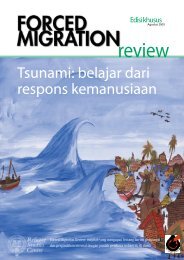FMR 42 full issue pdf - Forced Migration Review
FMR 42 full issue pdf - Forced Migration Review
FMR 42 full issue pdf - Forced Migration Review
Create successful ePaper yourself
Turn your PDF publications into a flip-book with our unique Google optimized e-Paper software.
<strong>FMR</strong> <strong>42</strong><br />
Sexual orientation and gender identity and the protection of forced migrants 25<br />
Continuing challenges<br />
A major area of continuing concern in<br />
LGBT decision-making is the quality of<br />
credibility assessment. The emphasis on<br />
‘self-identification’ as evidence of sexual<br />
orientation has led to accusations that these<br />
claims are easy to make and hard to disprove,<br />
and research indicates that decision-makers<br />
in Australia and the UK “have been slow to<br />
<strong>full</strong>y absorb and apply the insight that gay<br />
people are secretive about their sexuality and<br />
relationships as a result of oppressive social<br />
forces rather than by choice”. 6 Even if there is<br />
self-identification by the applicant as an LGBT<br />
person, he or she may still not be believed.<br />
Such inherent difficulties are in part due<br />
to the fact that credibility assessment is<br />
conducted by human beings who bring an<br />
element of subjectivity into the decisionmaking<br />
process. While the training developed<br />
in the UK allowed considerable time in<br />
the training session to look at individual<br />
attitudes to gay and lesbian applicants, it is<br />
important that authorities have a heightened<br />
awareness of the other subtle pressures that<br />
face decision-makers. For example, posttraumatic<br />
stress disorder can transfer to<br />
the decision-maker over time as a result of<br />
hearing such difficult and traumatic personal<br />
testimonies; this, combined with defensive<br />
coping mechanisms, can negatively affect the<br />
starting point of belief, disbelief or neutrality.<br />
The progress made in the UK on refugee<br />
protection for LGBT people is vital, progressive<br />
and life-saving. It is for this reason that there<br />
must be utmost concern to ensure that one<br />
problem is not replaced with another – by<br />
moving from discretion to disbelief.<br />
Amanda Gray graya@unhcr.org is Senior<br />
Protection Associate and Alexandra McDowall<br />
mcdowall@unhcr.org is Legal Officer with UNHCR<br />
in the UK. The views expressed in this article are<br />
those of the authors and do not represent the<br />
position of UNHCR or of the UN.<br />
1. UK Court of Appeal in HJ (Iran) and HT (Cameroon) and SSHD,<br />
(2009) EWCA Civ. 172, 10/03/09 para 96<br />
2. UNHCR Guidance Note on Refugee Claims Relating to Sexual<br />
Orientation and Gender Identity, 21 November 2008 para 26.<br />
Guidance Note superseded in 2012 by new Guidelines: see article by<br />
Volker Turk pp5-8.<br />
3. UK Lesbian and Gay Immigration Group, Failing the Grade: Home<br />
Office initial decisions on lesbian and gay claims for asylum, April 2010<br />
http://tinyurl.com/UKLGIG-Failing-the-Grade-2010<br />
Stonewall, Immigration and Asylum,<br />
www.stonewall.org.uk/what_we_do/research_and_policy/2874.asp<br />
4. UNHCR Guidance Note 2008<br />
5. http://tinyurl.com/Coalition-programme-2010 (p18)<br />
6. Millbank J ‘From discretion to disbelief: recent trends in refugee<br />
determinations on the basis of sexual orientation in Australia and<br />
the United Kingdom’, International Journal of Human Rights, 2009,<br />
Vol. 13, 391–414 See footnote 1, at p. 392<br />
http://papers.ssrn.com/sol3/papers.cfm?abstract_id=1330175<br />
Seeking asylum in the UK: lesbian perspectives<br />
Claire Bennett and Felicity Thomas<br />
Many aspects of the UK asylum process can be confusing, disempowering and traumatic<br />
for lesbian asylum seekers. Recent research examines the impacts of this process on their<br />
experiences, their identity and their well-being.<br />
Individuals making asylum claims based<br />
on persecution which relates to their sexual<br />
orientation need to argue their case under<br />
the ‘particular social group’ category of the<br />
1951 Refugee Convention. This category has<br />
long been the most contested of the Refugee<br />
Convention grounds and such claims can<br />
result in an intricate and lengthy asylum<br />
application process. For asylum claims based<br />
on a person’s sexuality, their cases can be<br />
further complicated by the requirement<br />
to produce evidence of their sexuality.<br />
This article is based on recent doctoral<br />
research which examined the ways that<br />
lesbian women navigate the UK asylum<br />
process and the impacts of this process on<br />
their experiences, their identity and their<br />
well-being. 1 All of the women interviewed<br />
had experienced physical and sexual violence




